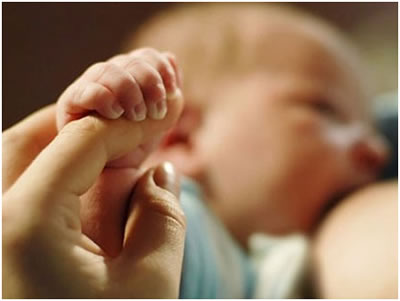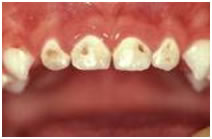Breastfeeding and Infant Tooth Decay

Infants who are strictly breast fed are more resistant to tooth decay than those who are fed sugar-rich foods together with infant formulas and cow’s milk. But when sugary substances are alternated with breastfeeding, breast milk becomes a dangerous catalyst that can lead to rampant dental caries.
Pamela Erickson, DDS, PhD and researchers at the University of Minnesota investigated the decay potential of human breast milk. In laboratory studies, breast milk alone did not damage tooth enamel. But when combined with another sugar source, the breast milk/carbohydrate combination is highly cariogenic. Results of the study were published in the April issue of Pediatric Dentistry, the Journal of the American Academy of Pediatric Dentistry.
Researchers concluded that breast milk prohibits acid and bacterial growth in the mouth. However, breast milk has a "low buffering capacity" and does not buffer the addition of acid. When breast milk is alternated with sugar, the rate of caries development is faster than that of sugar alone.
From an oral health perspective, pediatric dentists believe that breast milk alone is indeed the healthiest option for infants. But introducing sugar from food and beverages into the infant’s diet while breastfeeding is hazardous. Gaining proper nutrition from breast milk or food is the primary goal of infant health, and early dental intervention and monitoring may be the best way to prevent early childhood caries in the breast- and bottle-fed infant.
Pediatric dentists recommend that parents schedule their child’s first dental examination when the first tooth erupts or no later than the first birthday. Infants who are evaluated by a pediatric dentist at an early age are less likely to develop dental caries and oral diseases that can interfere with nutrition, learning to speak, or oral-facial development.

Early childhood caries
Sources
Pamela R. Erickson, Elham Mazhari: Investigation of the role of human breast milk in caries development. Pediatric Dentistry, 21:2, 1999
http://www.aapd.org/media/pressreleases/breastfeeding-99.asp





